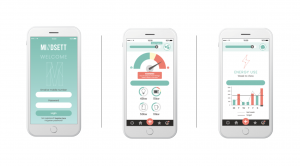Encouraging Long Lasting Employee Energy Saving Behaviour Change through IoT
Mindsett is a technology startup from Cloudfm Group, recent winners of the Queens Award for Innovation. Mindsett helps organisations reduce their costs and eliminate unnecessary waste. Their focus to make today’s world more sustainable and change behaviours is achieved through patent pending asset monitoring technology, combined with AI and machine learning.

Mindsett is using technology differently to inspire sustainable change across multi-site clients, working towards a fully automated and prescriptive maintenance model that will fundamentally transform the way properties are managed.
Mindsett were awarded an EIRA R&D grant to collaborate with psychologists Dr. Marie Juanchich, Dr. Kathryn Buchanan and Professor Riccardo Russo at the University of Essex.
This project aimed to help Mindsett understand and influence employee energy-saving behaviours for retail food and beverage (Retail F&B) clients via a mobile application.
The Challenge
In the drive towards Net Zero Mindsett wanted to understand how to design an energy-saving app that engages front-line employees and drives sustained energy-saving behaviours in the workplace. Information about energy use can be particularly confusing for consumers, even more so in a hectic workplace. However, it is estimated that technologies such as IoT, AI and ML could save the retail food and beverage (F&B) sector around 20% on energy a year. As well as the environmental gains, this would save significant funds; another key driver with the disruption that Covid-19 has caused the sector over the past 18 months.

Technologies such as IoT, AI and ML also have the power to identify significant savings in energy consumption and labour and the resultant financial gains, but these can only be realised if people buy into the benefits, adopt the recommended actions and behave differently.
Therefore, communicating energy use in a way that is clear, comprehensible and motivating for employees would be crucial for the success of the project.
The Approach
The project was supported by PhD student Daniel Jolles, who worked as a Research Associate helping design behavioural solutions that work with the IoT technologies.
The project took a behavioural science approach to understand the energy-saving behaviours of frontline workers. This was conducted by qualitative interviews with Mindsett customers, which provided the project with personal insights about energy-saving in their workplaces and also the use of mobile and tablet applications at work.
The next stage of the project was to conduct qualitative surveys to identify themes and specific opportunities and barriers to energy-behaviour change in the workplace.
Finally, Mindsett used experimental designs to test worker’s energy-saving comprehension and motivations in response to different design concepts and under different workplace scenarios.
The Outcome
In order to ensure the energy-saving application can be successfully rolled out to users, this research has identified key information about staff readiness, current device usage and differences between franchise and company-owned chains in energy-saving needs.
- 84% of retail workers believe the energy-saving app would benefit their workplace
- Only 1 in 4 employees believe their company is currently taking the necessary challenges towards achieving Net Zero seriously
Additionally, testing of different designs and metrics have helped Mindsett understand how they can make energy-saving performance more ‘real’ to workers and keep them motivated to save energy over time.
David Attoe, IOT Development Director commented:
“This EIRA project has produced significant business insights on how to design the Mindsett energy saving app and how it might help clients within Retail F&B. Following this success, Mindsett and the academic team have been successful in securing further UKRI Innovation funding to share their findings with a broader industry audience and the team are looking to extend their research collaboration into new strategic areas, including risk and compliance and predictive maintenance.”
Next Steps
This EIRA project has produced significant business insights on how to design the Mindsett energy saving app and how it might help clients within Retail F&B. Following this success, Mindsett and the academic team have submitted an application for an Innovate UK Knowledge Transfer Partnership (KTP). This KTP would extend this research into two new strategic areas, risk and compliance and predictive maintenance.
David Attoe and Daniel Jolles delivered a presentation on the project at our virtual EIRA Showcase. You can watch this here:
Contact for any queries
Emma Wakeling, EIRA Knowledge Exchange Manager
David Attoe, IOT Development Director
